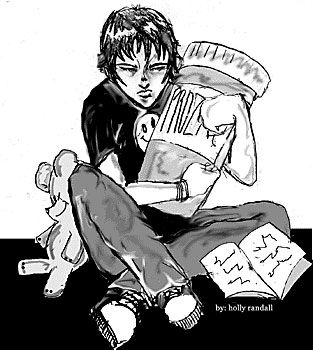
Illustration By Holly Randall
|
|
By Sara Warzecka
Arizona Daily Wildcat
Wednesday, March 31, 2004
Print this
After pleas from numerous families who have lost loved ones on antidepressants to suicide, the Food and Drug Administration agreed last week to require a warning label for all antidepressants. The warning expresses the possible increase of depression and suicidal tendencies within the first weeks of treatment with any new medication. However, there is no definite evidence of a relationship between the antidepressants these people were taking and the fact that they committed suicide.
One could see two possibilities in this situation. The first is that prescription medicines, such as Prozac, Zoloft and Celexa, really do have an adverse effect on an already frail psyche and disheartened state of mind and can cause patients to grow more depressed and even kill themselves. Or perhaps ÷ what appears more likely to some ÷ these people were depressed in the first place and the antidepressants did nothing to help ease their mental anguish.
Of course, many Americans swear by the effects of antidepressants ÷ some 30 million, according to Newsweek. Nevertheless, studies have shown that some people react just as well to placebos. Maybe the results of these drugs only require a mind eager for the desired effect and minimal amounts of actual medicine. If that's how it works, it would certainly help pharmaceutical companies save money on production and bring in enormous revenue from the happiness-hungry population.
Americans have become dependent on outside sources for their own personal happiness. Prior to the birth of antidepressants, Americans coped with being as naturally unhappy as they pleased. It has always been a way of life to find something to keep people happy and take their minds off what has to be a horrible and dreary existence. Each and every person has a crutch öö or more likely, multiple crutches. Crutches provide false or fleeting happiness when many have forgotten how to be happy on their own. They take people's minds away from what upsets them or what they can't understand. A crutch provides an easy fix.
People lead spoiled and egocentric lives. The idea that people need antidepressants to make life better is somewhat appalling. Some people can't attempt to function without external help. Of course, there are people with manic depression who need medical help to balance physiological problems, but that is only an insignificant minority in comparison to the number of people on antidepressants. The average person perhaps has no concept of the fact that his or her life could be vastly worse. Imagine living right now on the streets of Afghanistan or Iraq. That might make your head hurt, but take an ibuprofen, not a Prozac.
Schools train psychiatrists to prescribe massive amounts of medication to solve every problem. Many psychiatrists have come to prefer this method rather than talking the problem out until arriving at a psychological source. No evidence suggests this trend will dissipate with future psychiatric generations. Doctors diagnose patients with mild depressive disorders that in truth happen to everyone at different points in their lives. The roots of these depressive bouts are surely psychological, rather than purely physiological.
Psychiatrists apparently have no problem prescribing antidepressants to minors. The fact that 10 million children take antidepressants should horrify everyone. Surely, this number mainly encompasses teenagers, but the teenage period involves learning to stand on one's own feet in many ways. If psychiatrists, counselors and parents tell teenagers early on that they need a pill to maintain happiness, they cannot learn to be happy on their own. They will bottle any negative emotions and reach for a pill bottle when future problems arise.
When it comes to being down, many people choose to be depressed. Perhaps they've given up or they're too pessimistic, but in many ways, they don't want to be happy anymore. That brings the desire for false happiness that apparently only a crutch like antidepressants can give. But maybe the feeling that medication gives is only brought on by the acknowledgement that the person actually wants to be happy. Maybe it's a momentary awareness that people can be happy on their own.
It's time to reach for self-help books. Go on amazon.com, look up Iyanla Vanzant and do some "mental housekeeping." Go for a run. Keep a diary. Even vegging out on the couch sounds like a better alternative to pill popping (depending on what's on).
It feels like only a rare few still swear by living high on life. Perhaps modern life doesn't give that natural high anymore, but it's still no excuse for chemical dependence.
Sara Warzecka believes you are only as happy as you truly want to be. She can be contacted at letters@wildcat.arizona.edu.

